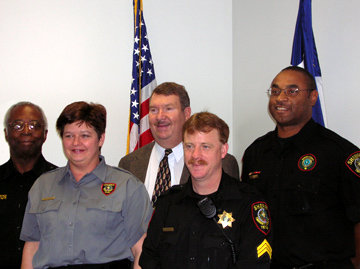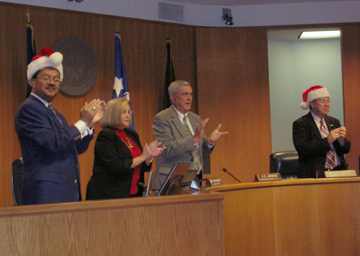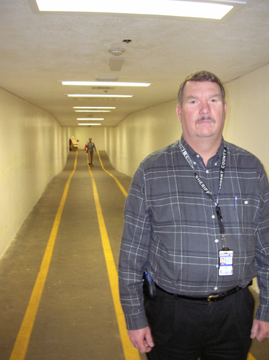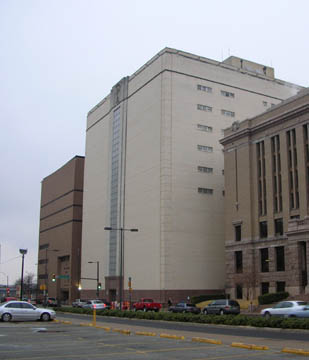|
|
 Some sheriff’s office employees have grumbled over changes made by Anderson, center, but smiles prevailed at a recent commissioners court meeting when longtime workers were honored.
Some sheriff’s office employees have grumbled over changes made by Anderson, center, but smiles prevailed at a recent commissioners court meeting when longtime workers were honored.
|
 Commissioners Roy Brooks, Marti VanRavenswaay, J. D. Johnson, and Glen Whitley loosened up during a December meeting, but there was plenty of tension a few weeks earlier when the sheriff issued a public challenge.
Commissioners Roy Brooks, Marti VanRavenswaay, J. D. Johnson, and Glen Whitley loosened up during a December meeting, but there was plenty of tension a few weeks earlier when the sheriff issued a public challenge.
|
 Underground passages allow Anderson’s staff to transport prisoners from jail to courtrooms without exposing them to the public.
Underground passages allow Anderson’s staff to transport prisoners from jail to courtrooms without exposing them to the public.
|
 The funky-looking 1962-vintage building, center, that houses the sheriff’s office could be the eventual site of a new downtown jail.
The funky-looking 1962-vintage building, center, that houses the sheriff’s office could be the eventual site of a new downtown jail.
|
|
A D V E R T I S E M E N T
|
|
|
|
A D V E R T I S E M E N T
|
|
Making Up is Smart to Do
The sheriff and the commissioners aren’t throwing crockery. That’s good.
By JEFF PRINCE
As political honeymoons go, the one between Sheriff Dee Anderson and Tarrant County commissioners was probably a record-setter. But even in the best marriages, the first argument arrives eventually.
At the Tarrant County courthouse, the animosity that had been simmering for months spilled over into the public arena when the sheriff stood before Tarrant County commissioners and drew a proverbial line in the sand. A new jail must be built downtown, Anderson declared at the Nov. 8 commissioners meeting. Downtown developers and power players might want it farther north, out of sight and out of mind, but Anderson wanted it smack dab downtown and that was final.
Roy Brooks, the court’s newest commissioner, tested Anderson’s resolve. “What happens if we as the county commission elect to provide jail beds someplace you don’t want?” he said. After all, commissioners, not sheriffs, determine where jails are built.
The sheriff’s response stunned them. He vowed to fight a proposed $350 million bond election intended to raise money for the jail.
On many occasions, dating back to Feb. 2003, Anderson had said he doesn’t want to transport maximum-security prisoners back and forth from downtown courts to the Green Bay jail near Loop 820 North and I-35, the location most county officials and downtown developers seemed to be leaning toward for the new lockup. Despite Anderson’s oft-stated objections, commissioners continued studying the possibilities.
They were discussing a cost study when Anderson pulled a stunt faintly reminiscent of David Williams, the former Tarrant County sheriff who wreaked havoc by constantly clashing with commissioners.
“I’d be interested to see if the citizens would pass a bond election to build a jail that the sheriff was opposed to,” Anderson said.
The words were spoken in Anderson’s typical court demeanor — matter-of-factly and without rancor. But they were tantamount to a declaration of war.
Williams, during his eight years in office, was routinely dismissive toward the five members of the commissioners court who oversee the county’s budget. Anderson had been heralded as the conciliatory sheriff who understood the push and pull of politics. Now, the same guy who had been begging for a bigger jail to handle the county’s growing number of prisoners was threatening sabotage.
The following week, Commissioner Glen Whitley directed county staff to research the cost of moving the entire court system — jail, courts, jurors, everything — to Green Bay. Some saw this as a counter-punch to Anderson’s hard right jab. The fight was on. Based on past squabbles between commissioners and former sheriffs such as Williams and Don Carpenter, courthouse watchers thought things might get ugly. If history served as an example, more clashes would probably follow until commissioners became fed up and political string-pullers started looking for a candidate to oust Anderson in a future election.
Later, when someone asked him about the jail conflict, Anderson was realistic. “It’s me on one side and Downtown Fort Worth Inc. and Fort Worth Chamber of Commerce and the Bass family on the other side. Who would you bet on?” he said.
So it came as a surprise when Whitley and other commissioners suddenly agreed that the sheriff’s office and jail should remain downtown near the criminal courts. Anderson had won the battle and appeared to have done so without dooming his future, although relationships were strained. Weeks after Anderson’s public defiance, Brooks was still peeved. “We all understand political posturing, but I don’t think that was particularly helpful to the process,” he said.
Whether or not the squabble planted the seed for future problems remains to be seen, but commissioners and the sheriff are at peace again. Anderson maintained his persona as the fair-haired boy who has brought stability to an office known for its quagmires. Commissioners came across as being willing to examine all options in an attempt to protect tax dollars but willing to compromise when evidence favored the sheriff’s stance.
The honeymoon might be over, but at least the bride and groom are still speaking, and that’s progress when it comes to Tarrant County politics.
Anderson took over as sheriff in January 2001, and his first term passed in harmony with the commissioners court. As expected, the Williams era of acrimony (1992-2000) blossomed into the Anderson age of alliance. The new sheriff and commissioners stuck together during tough negotiations with Fort Worth over a new jail contract. Unable to reach an agreement, the city eventually signed with Mansfield and began hauling prisoners 30 miles away. It was a bold move that backfired and cost the city more money in medical and transportation-related costs than had been foreseen. As that five-year contract nears its end, the city and county have renewed negotiations — “at their request, I might add,” Commissioner J. D. Johnson said during a recent meeting.
The Anderson-commissioners lovefest thrived even when the sheriff was getting criticism from other quarters. A series of internal moves, including new promotion policies, upset some jailers and deputies. Commissioners viewed the tinkering as much-needed housecleaning. Employees also groused about Anderson putting a half-dozen former Arlington Police Department buddies (all of them white men) in high-level positions. The group was derisively dubbed the Arlington Mafia.
Commissioners weren’t just unconcerned, they were positively enthralled that the sheriff drastically cut overtime costs. In Williams’ final year, jail employees racked up almost $2 million in overtime costs. In 2001, Anderson’s first year, overtime costs decreased by more than 90 percent.
The sheriff was elected to another four-year term in 2005, and signs of trouble surfaced a short time later.
Butting heads isn’t unusual among county officials, and sheriffs and commissioners are particularly predisposed to wrangling. All are elected officials with no bosses, free to do as they choose without answering to anyone other than typically languid voters. Commissioners control the sheriff’s budget, but the sheriff controls the jail.
Following Tarrant County Judge Tom Vandergriff’s keep-it-nice policy, commissioners tend to keep verbal fisticuffs behind closed doors. The public is most often shown a unified front, and Anderson had tried to play by those rules. However, for some time, he had been upset by the poor quality of jail medical services provided by JPS Health Network. But the hospital inks its contracts with commissioners, not the sheriff. Anderson had little sway among the hospital hierarchy, and he felt that commissioners weren’t doing much to solve the problems.
Anderson, a high school football referee and former Fort Worth Press sportswriter, surely knows a thing or two about sports psychology and how the press works. Coaches such as the Dallas Cowboys’ Bill Parcells are masters at planting quotes in newspapers to motivate or send messages to players. Commissioners no doubt noticed an Oct. 2 Fort Worth Star-Telegram story that spotlighted dismal problems with jail medical services and revealed that Anderson had previously complained to county officials and told them he had contacted a company claiming it could provide better service.
“County commissioners were upset with Anderson’s move,” reporter Jennifer Autrey wrote. “They feared public embarrassment if the Star-Telegram found out.”
The story revealed the contents of e-mails not intended for public perusal. Commissioner Marti VanRavenswaay, for instance, e-mailed the hospital CEO saying that if Anderson’s bid for a new vendor reached the media, “there will be a lot of finger pointing — and explanations required.”
The hospital board chairman wrote in an e-mail to the CEO: “Frankly, I’d love to assist in getting [Anderson] in so much ‘hot water’ with commissioners that they will let us drop the jail.”
The sheriff had shattered political protocol and embarrassed commissioners, who are well aware that Anderson, a longtime media spokesman for the Arlington Police Department, has forged good working relationships with numerous reporters over the years and could easily push for a revealing story. Autrey, then one of the paper’s top reporters, wrote a story that made hospital officials look smarmy, commissioners inattentive, and the sheriff riding tall in the saddle.
Anderson recently told Fort Worth Weekly that he wasn’t trying to embarrass anyone, merely seeking better medical services.
“It was one of those situation where I felt like for a while I had been running the red flag up, saying, ‘We need help, we need help,’ and it was one of those things where I said something had to be done,” he said.
He got on some nerves but proved his point and prompted long-overdue action. “Things are much better than they were a year ago,” he said. “We are well on the way to recovery.”
Just weeks after that public humiliation, commissioners were about to get another dose.
The Nov. 8 showdown astonished and angered commissioners, but that was the effect Anderson was seeking when he vowed to buck the bond election. “When I said it, there was an audible gasp in the room,” he said. “It was like everybody went, ‘Holy cow!’But ... I was at that point. They weren’t hearing what I was saying.”
The discussion began with commissioners considering various options for a new jail, something the sheriff has sought for years. State prisons are crowded now and expected to become more so in the future, and that bottleneck is creating gluts in county jails. The Tarrant County jail has operated at near capacity for most of Anderson’s tenure. With the county and city once again negotiating to place city prisoners in the county jail, Anderson envisions his lockup’s population reaching crisis levels in the coming years. And he insists the safest and most cost-effective place to build a jail is downtown.
Commissioners weren’t so sure it couldn’t be done cheaper at Green Bay. Also, they were feeling pressure from downtown developers, who don’t want another jail in their midst and consider the portion of Trinity River bluff where the sheriff’s office is housed as a prime spot for private development, which in turn would generate more tax dollars.
The Nov. 8 meeting evolved into a long debate as commissioners weighed the options of expanding the medium-security Green Bay facility to house more-dangerous criminals. Johnson supported the sheriff, reminding commissioners that previous courts had studied and discarded the idea of moving the jail from downtown. Having a jail far from the criminal courts system triggers a chain reaction of problems, most notably the costly and potentially dangerous transportation of prisoners. Removing the jail would also take away large numbers of people — jail employees, lawyers, bail bondsmen, families of inmates, etc. — from downtown, possibly creating an economic crisis for retailers.
Whitley was blasé about Johnson’s summary of the sheriff’s wishes. “That’s a desire of [Anderson], but it may not be a desire of ours,” he said. Anderson was in the room listening intently but saying nothing.
Whitley made it clear that the city’s movers and shakers — Downtown Fort Worth Inc., the Fort Worth Chamber of Commerce, city council members, and private developers — preferred that the jail and its inmates be moved elsewhere, clearing more room for their vision of reinventing the Trinity River as a development paradise.
“My big reason,” Whitley began, and then changed his approach, “Another big reason for not wanting [the jail] downtown is I think the whole development of downtown where we’re talking about is something I’m not excited about putting another jail in the middle of.”
Johnson favored tearing down the old county jail on West Belknap and building a fetching new jail that didn’t particularly look like a jail. Whitley persisted. “I’d love to tear that building down and make it a four-story national headquarters for two or three different firms that come to Fort Worth,” he said, comparing it to other downtown “signature buildings” such as RadioShack and Pier 1 Imports.
Brooks concurred. “As far as I’m concerned, everything we’ve got is for sale,” he said.
Vandergriff suggested they continue the discussion at a later meeting. Whitley instead invited the sheriff to the podium to share his thoughts. “Where would you like me to begin?” Anderson said with a rueful laugh, leaving no doubt about his frustration.
“I said in July, and I’ll say it again — we will not house maximum-security prisoners at Green Bay; that is not an option as long as I am sheriff of this county,” he said, adding that he hoped commissioners would compromise.
“We’re not coming to a very good compromise when the first statement you make out of your mouth is, ‘As long as I am sheriff we’re not compromising,’” Whitley countered.
Anderson found himself in the same precarious position as previous sheriffs — a solitary man certain of his beliefs, standing at a podium and making his case to five commissioners with forceful personalities and varying, shifting viewpoints. Commissioners don’t always get along or agree among themselves but tend to band together when public servants stand before them delivering ultimatums.
Johnson reminded everyone that the jail debate had dragged on for years and that a decision would have to be reached soon; otherwise the delay could force postponement of a long-planned 2006 bond election. “I don’t think we can delay any longer,” he said.
That was when Brooks challenged Anderson and prompted the sheriff’s jaw-dropping vow to withdraw support for the bond election. The acrimony didn’t stop there. Commissioners said an independent architectural study showed that building a new downtown jail would cost almost twice as much as building one at Green Bay.
“I severely, severely believe these numbers are not ... ,” Anderson started but then paused, choosing his words carefully. “There was a desire to make these numbers what they are.”
Commissioners groaned in unison.
“Now wait a minute,” VanRavenswaay started.
“If you’re implying that we cooked the numbers ... ,” Whitley began.
“I’m not saying that at all,” the sheriff replied, trying to soften his words without necessarily retracting his accusation. “I believe they [consultants] went in with a feeling that this was the direction that people wanted to go in.”
The study commissioned by the county showed that building a downtown jail would cost $87 million, whereas renovating Green Bay would cost about $47 million. VanRavenswaay said voters might kick them out of office if commissioners spend $40 million extra to keep the jail downtown because the sheriff refused to budge.
“I know all of this deals with political courage, and it does for me as well,” Anderson said.
Whitley’s voice raised a notch as he asked Anderson whether he minded a large tax increase to pay for a downtown jail.
“I’m not saying that at all,” Anderson said.
“That’s right!” a perturbed and perhaps not too articulate Whitley said. “That’s exactly what I’m saying! You’re not saying that at all.”
Anderson again disputed the cost study.
Whitley said he planned to examine other county’s sheriff’s offices to see whether they transported maximum-security prisoners, and, if so, “you ought to be able to do it too.”
“I’ve said my opinion, and I’m not changing my mind,” Anderson said. “We will not house maximum-security prisoners out there.”
“I understand you’re not willing to compromise,” Whitley said. Afterward, he asked county staff to research the cost of moving the jail, the courts, jurors, and the entire criminal justice system to a large parcel of land adjoining the Green Bay facility. The request seemed preposterous, without even considering the historic ramifications. The intricate criminal courts system involves numerous downtown buildings, including fairly new ones such as the Justice Center, built in 1990. County staffers’ response ended any further thoughts along those lines: Moving everything would cost an additional $150 million.
Subsequent studies of the cost of transporting prisoners to Green Bay proved the sheriff correct — a downtown jail would be cheaper and safer.
The concrete tunnels that provide the sheriff’s office with access to the Justice Center and correctional facilities offer advantages for moving prisoners to courtrooms at minimal cost and with little chance of endangering the public.
“Now we’re directly in the basement of 350 West Belknap,” Anderson said recently, leading a reporter through the tunnel system. “This is the tunnel that is going to take us across Belknap and up into the basement of the corrections center.”
This same trip at ground level takes a while. Sidewalks, pedestrian crosswalks, and traffic lights come into play. Underground, however, a trip from the sheriff’s office to the justice center is quick and completely isolated. Ushering prisoners to court this way means “never exposing them to a public street,” Anderson said.
The safety advantages, financial efficiency, and historic significance of keeping the court system, including the jail, at a downtown location seemed a no-brainer to Anderson, and he didn’t expect such difficulty convincing commissioners. The raucous meeting left everyone with little doubt about his commitment to a downtown jail, but Anderson still didn’t sense that commissioners completely bought into his reasoning. So he was pleasantly surprised to get a phone call the following week from Whitley, the commissioner who had seemed the most unbending regarding jail location.
“Glen called me and said, ‘I want to come talk to you.’ We just sat here and worked it out,” Anderson said.
Whitley didn’t pretend to ignore the sheriff’s previous tactics. “He basically said I was too harsh,” recalled Anderson, who kinda sorta tiptoed toward contrition. “I said I had got my back bowed up, and we understood where we were.”
Anderson then filled the commissioner’s ears with a convincing sales pitch. “Glen is supporting the downtown jail now,” Anderson said. “I think it evolved from Glen being a smart guy and figuring out the issues and listening to what I have to say.”
Whitley’s mind was more likely changed after learning that transporting inmates to Green Bay would cost an additional $66 million over 20 years, something the original study hadn’t considered. Still, the pow-wow between sheriff and commissioner smoothed troubled waters.
“I did go and meet with the sheriff and listen to his concerns,” Whitley said. “He described some of the environment when they transport prisoners, and I better understood what he was saying.”
He recalled Anderson using a recent murder case as an example. The defendant, who was incarcerated and being led by sheriff’s employees to court every day, had told them he expected to be sentenced to death and had nothing to lose. He picked fights and looked for any opportunity to create disturbances. Moving prisoners such as that on public streets on a daily basis could be a nightmare — a dangerous and politically expensive nightmare.
Previous communication breakdowns between the sheriff and commissioners, beginning with the flap over jail medical services, probably added to the hostility of the Nov. 8 meeting.
“That was just everybody being frustrated by the fact that maybe we’re not talking and communicating enough except during court,” Whitley said. “As a result of that, I thought I needed to take a step back and communicate with him more. I certainly understand where he is coming from more.”
The commissioner was also impressed by Anderson’s willingness to compromise, despite his public words. Anderson emphatically believes the county-owned Mueller Building just west of the corrections center is the ideal site for the new jail. But commissioners are leaning toward demolishing and rebuilding the old county jail at 300 W. Belknap. Anderson said he could accept the West Belknap location. “It’s doable,” he said.
While commissioners and the sheriff realize that strained relationships have led to problems that didn’t exist during Anderson’s first term, it’s still a matter of perspective.
“With David Williams, we couldn’t get him to return phone calls and talk to us,” Whitley said. “Dee has always been willing to meet at the drop of the hat. Another thing we have to give him and his people credit for, unlike the prior sheriff who refused to communicate and talk with us and ran a tremendous amount of overtime through the jail, this guy came on board and without adding people took the overtime back down to nothing.”
So, bridges remain unburned. During his initial run for office, Anderson promised his backers two terms as sheriff. But he is enjoying the job and can envision a longer stay. Many more fruitful years of cooperation are possible, even with the occasional war cry, he said.
“I look around the state at relationships between commissioners and sheriffs, and by the very nature of what both entities are trying to do, it puts you at odds with one another,” he said. “The one thing that I keep trying to impress on everyone is that with me, none of this is personal. This is business. I have the best interests of the jail at heart, and they have the best interests of the county and the commissioners’ positions at heart, and we are not always going to agree.
“Unfortunately the history of county government is that people take things very personally. We are not always going to agree, but we can always maintain a relationship, I believe, that benefits us both.”
Spoken like a man who’s been to a marriage counselor. Or one who knows the cost of a divorce these days.
You can reach Jeff Prince at jeff.prince@fwweekly.com.
 Email this Article...
Email this Article...

